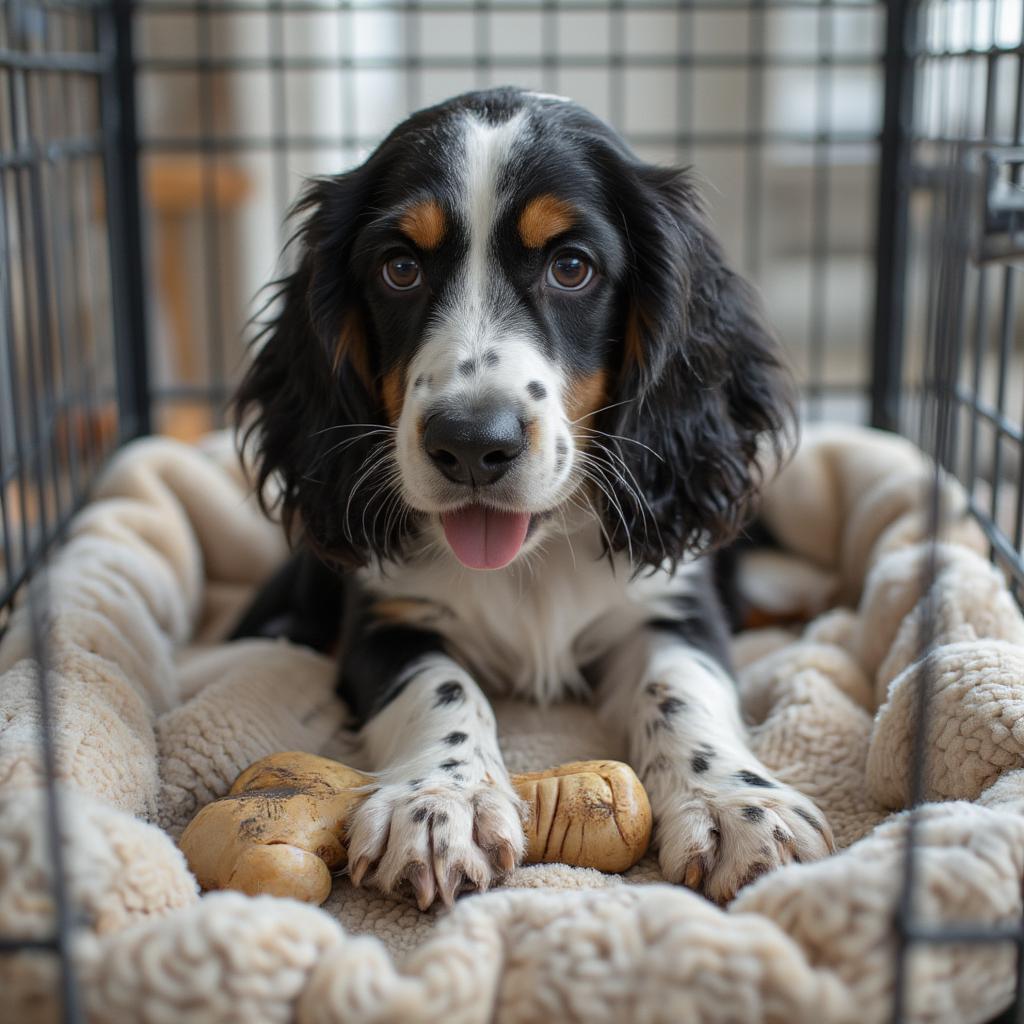Basset Hound puppies, especially those with the classic black and white coloration, are undeniably adorable. Their long, droopy ears, soulful eyes, and short legs make them a popular choice for families and individuals alike. But before you welcome a Basset Hound puppy into your home, it’s crucial to understand their unique needs and characteristics. This comprehensive guide will delve into everything you need to know about black and white Basset Hound puppies, from their temperament and training to their health and grooming requirements.
Temperament and Personality of Black and White Basset Hound Puppies
Basset Hounds are known for their gentle, affectionate, and good-natured personalities. They are generally friendly with children and other pets, making them excellent family companions. However, their independent nature, inherited from their scent hound ancestry, can sometimes make training a bit challenging. Black and white Basset Hound puppies, like all Basset Hounds, are playful and curious but also prone to stubbornness. Early socialization and consistent training are key to raising a well-behaved Basset.
Are Black and White Basset Hounds More Stubborn?
While the color of a Basset Hound doesn’t directly influence their temperament, all Bassets are known for their independent streak. This independence can sometimes be perceived as stubbornness, especially when it comes to training. Patience and positive reinforcement are essential when working with these hounds.
Training Your Black and White Basset Hound Puppy
Training a Basset Hound requires patience, consistency, and a positive approach. They respond best to reward-based training methods, such as using treats and praise. Start training your Basset puppy as early as possible, focusing on basic commands like sit, stay, come, and down. Housebreaking can sometimes be a challenge with Basset Hounds, so be prepared for potential accidents and use positive reinforcement to encourage good habits.
What is the Best Way to Housebreak a Basset Hound Puppy?
Crate training can be highly effective for housebreaking Basset Hound puppies. The crate provides a safe and secure space for your puppy and helps establish a routine for potty breaks. Consistency is key, so take your puppy out frequently, especially after waking up, eating, and playing.
 Basset Hound Puppy Crate Training
Basset Hound Puppy Crate Training
Health Considerations for Basset Hound Puppies
Black and white Basset Hound puppies are generally healthy, but like all breeds, they are prone to certain health issues. Some common health concerns in Basset Hounds include:
- Ear Infections: Due to their long, droopy ears, Basset Hounds are susceptible to ear infections. Regular ear cleaning is essential to prevent this problem.
- Glaucoma: This eye condition can lead to blindness if left untreated. Regular veterinary checkups are important for early detection.
- Hip and Elbow Dysplasia: These are genetic conditions that can cause joint pain and mobility issues.
- Bloat: This is a life-threatening condition that can occur in deep-chested breeds like Basset Hounds.
How Can I Keep My Basset Hound’s Ears Healthy?
Cleaning your Basset Hound’s ears weekly with a veterinarian-approved ear cleaner can help prevent infections. Be sure to dry the ears thoroughly after cleaning.
Grooming Your Black and White Basset Hound Puppy
Basset Hounds have a short, smooth coat that is relatively easy to groom. Regular brushing helps remove loose hair and keeps their coat healthy and shiny. Their droopy ears and wrinkles require special attention. Clean the ears weekly and wipe the wrinkles daily to prevent skin infections. Basset Hounds are also known for their drooling, so keep a towel handy to wipe their face.
How Often Should I Bathe My Basset Hound Puppy?
Bathing your Basset Hound every 4-6 weeks is usually sufficient, unless they get particularly dirty. Use a gentle dog shampoo and conditioner to avoid drying out their skin.
Finding a Reputable Breeder
If you’re looking to buy a black and white Basset Hound puppy, it’s crucial to find a reputable breeder. A good breeder will prioritize the health and well-being of their dogs, provide proper socialization, and be knowledgeable about the breed. Ask questions about the puppy’s parents, health testing, and living conditions. Avoid puppy mills and pet stores, as they often prioritize profit over animal welfare.
What Questions Should I Ask a Basset Hound Breeder?
Ask about the health testing done on the parents, the puppy’s vaccination and deworming schedule, and the breeder’s experience with the breed. Observe the living conditions of the dogs and ask to meet the puppy’s parents if possible.
Is a Basset Hound Right for You?
Black and white Basset Hound puppies are charming and lovable companions, but they are not the right breed for everyone. Their independent nature and potential for stubbornness require patient and dedicated owners. Consider your lifestyle, living situation, and experience with dogs before bringing a Basset Hound puppy into your home. If you can provide them with the love, training, and care they need, a Basset Hound can be a wonderful addition to your family. Similar to black and tan coon hound puppies, Basset hounds have unique needs.
Conclusion
Black and white Basset Hound puppies bring joy and companionship to their families. Their unique appearance and gentle nature make them a popular choice for dog lovers. By understanding their specific needs and committing to proper training and care, you can ensure a happy and healthy life for your Basset Hound companion.
FAQ
- Are black and white Basset Hounds rare?
- Do Basset Hounds bark a lot?
- How much exercise does a Basset Hound need?
- Are Basset Hounds good with cats?
- What is the lifespan of a Basset Hound?
- Do Basset Hounds shed a lot?
- Are Basset Hounds easy to train?
